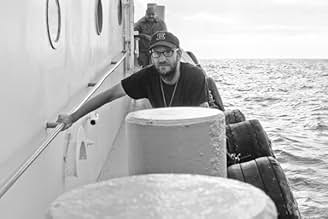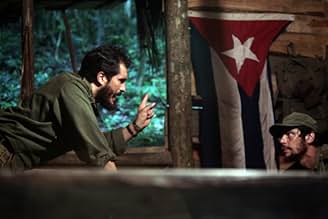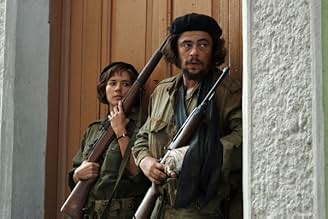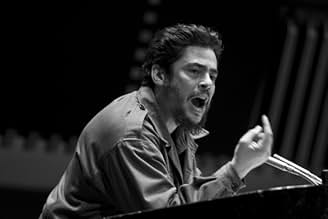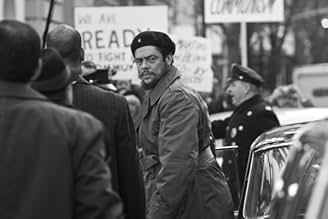ÉVALUATION IMDb
7,1/10
48 k
MA NOTE
En 1956, Ernesto « Che » Guevara et une bande d'exilés cubains dirigés par Castro mobilisent une armée pour renverser le régime du dictateur Fulgencio Batista.En 1956, Ernesto « Che » Guevara et une bande d'exilés cubains dirigés par Castro mobilisent une armée pour renverser le régime du dictateur Fulgencio Batista.En 1956, Ernesto « Che » Guevara et une bande d'exilés cubains dirigés par Castro mobilisent une armée pour renverser le régime du dictateur Fulgencio Batista.
- Prix
- 4 victoires et 13 nominations au total
Oscar Isaac
- Interpreter
- (as Óscar Isaac)
María Isabel Díaz Lago
- María Antonia
- (as María Isabel Díaz)
Demián Bichir
- Fidel Castro
- (as Demian Bichir)
Ramon Fernandez
- Héctor
- (as Ramón Fernández)
Yul Vazquez
- Alejandro Ramírez
- (as Yul Vázquez)
Jsu Garcia
- Jorge Sotús
- (as Jsu García)
Luis Alfredo Rodríguez Sánchez
- Rebel Messenger #1
- (as Luis Rodríguez Sánchez)
Roberto Santana
- Juan Almeida
- (as Roberto Luis Santana)
Histoire
Le saviez-vous
- AnecdotesFor his role, Benicio Del Toro spent seven years researching Guevara's life.
- GaffesWhen the guerrilleros are in the Sierra Maestra, we can hear the coqui (Eleutherodactylus coqui) singing in the night. However, this small frog is endemic to Puerto Rico and the Virgin Islands, thus not possible to be heard in Cuba.
- Citations
Lisa Howard: What is the most important quality for a revolutionary to possess?
Ernesto Che Guevara: El amor.
Cuban Diplomat #1: [translating] Love.
Lisa Howard: Love?
Cuban Diplomat #1: Love of humanity... of justice and truth. A real revolutionary goes where he is needed.
- ConnexionsFeatured in Así se hizo - Che El Argentino (2008)
- Bandes originalesBasura
Written and Performed by Mark A. Mangini (as Mark Mangini)
Commentaire en vedette
He was a revolutionary fighter, a doctor, a social philosopher and a martyr who turned to armed warfare as a 'necessary' means of stamping out the foreign complexities, poverty and injustice that had bled South America for centuries. He was a Marxist, a writer, a guerrilla and a diplomat who rose to prominence as a leader of Fidel Castro's radical '26th of July Movement': a left wing political party that launched an armed invasion of Cuba rapt on toppling U.S backed dictator Fulgencio Batista. This historical revolt: the focal point of director Steven Soderbergh's enduring, coarse and superbly crafted part one of two biopic. A sometimes bitty, sometimes brilliant hand-held epic that succeeds in its failure to fall into the consumer culture camp that's exploited Ernesto 'Che' Guevara's image now for so long.
Steven Soderbergh refrains, then, from counteracting the magnitude of Che: Part One's dense political platform by ramping up the fireworks. This wont appeal to mainstream viewers. This is not a Cuban Braveheart. This is not some twisted Scarface prequel. There will be no post-movie pop-art. Che: Part One is an intelligent and vital take on the man behind the myth not a balls-to-the-wall action spectacle blaring with blood, bullets and CGI. It's a thorough and naturalistic treatise on iconic human drive and endeavour that infrequently shuttles between monochrome and Technicolor, between Che Guevara's 1964 delegation at the UN headquarters and time spent trudging through the Cuban jungle.
If your understanding of certain political ideals and movements are, at best, hazy- then it's best to steer clear of this one. You're likely are likely to find the first serving of Soderbergh's four-and-a-half-hour, two part political epic a little confusing. This ain't no Hollywood funded, slick and stylish, over-dramatic chronicle concerned with entertainment or income. This isn't 'Defiance' or 'Valkrye'. This is a well-researched, claustrophobic and paced political drama (shot in Spanish) where spurts of action, violence and humour are few and far between. Imagine Oliver Stone's 'Salvador' by the way of Terrance Mallick's 'The Thin Red Line': fragmented, anti-mainstream and very heavy-going.
The bravura Benicio Del Toro stars as Che and is quite excellent. He delivers a focused and unwavering performance worthy of a thousand accolades: his finest since '21 Grams'. The fact that Del Toro is fluent in Spanish also helps, as does a rallying and unknown supporting cast that work well as a low-key ensemble. It's all about Del Toro, though. His insurgent, intense and convincing Che is one marred by crippling bouts of asthma yet defined by a burning desire to educate and reform- to put his litigious beliefs into action and unite Latin America.
With Che: Part One, the diligent Steven Soderbergh has found his blend of realism and narrative, documentary and drama. As an avid Che fan and reader of his books and biographies, there is little doubt in my mind that this monumental work will stand as the first piece in the definitive two part screen portrait of one the twentieth century's most iconic, yet largely uncharted, political figures.
Final Verdict: While lesser films wallow in the limelight, Che: Part One stirs understated in the shadows seemingly content with the fact that it wont appeal to all, or many. Steven Soderbergh has crafted a very loyal and well-made biopic. One that demythologises, one that educates, one that excels and ensues Walter Salle's soul-searching Che preface: The Motorcycle Diaries.
Steven Soderbergh refrains, then, from counteracting the magnitude of Che: Part One's dense political platform by ramping up the fireworks. This wont appeal to mainstream viewers. This is not a Cuban Braveheart. This is not some twisted Scarface prequel. There will be no post-movie pop-art. Che: Part One is an intelligent and vital take on the man behind the myth not a balls-to-the-wall action spectacle blaring with blood, bullets and CGI. It's a thorough and naturalistic treatise on iconic human drive and endeavour that infrequently shuttles between monochrome and Technicolor, between Che Guevara's 1964 delegation at the UN headquarters and time spent trudging through the Cuban jungle.
If your understanding of certain political ideals and movements are, at best, hazy- then it's best to steer clear of this one. You're likely are likely to find the first serving of Soderbergh's four-and-a-half-hour, two part political epic a little confusing. This ain't no Hollywood funded, slick and stylish, over-dramatic chronicle concerned with entertainment or income. This isn't 'Defiance' or 'Valkrye'. This is a well-researched, claustrophobic and paced political drama (shot in Spanish) where spurts of action, violence and humour are few and far between. Imagine Oliver Stone's 'Salvador' by the way of Terrance Mallick's 'The Thin Red Line': fragmented, anti-mainstream and very heavy-going.
The bravura Benicio Del Toro stars as Che and is quite excellent. He delivers a focused and unwavering performance worthy of a thousand accolades: his finest since '21 Grams'. The fact that Del Toro is fluent in Spanish also helps, as does a rallying and unknown supporting cast that work well as a low-key ensemble. It's all about Del Toro, though. His insurgent, intense and convincing Che is one marred by crippling bouts of asthma yet defined by a burning desire to educate and reform- to put his litigious beliefs into action and unite Latin America.
With Che: Part One, the diligent Steven Soderbergh has found his blend of realism and narrative, documentary and drama. As an avid Che fan and reader of his books and biographies, there is little doubt in my mind that this monumental work will stand as the first piece in the definitive two part screen portrait of one the twentieth century's most iconic, yet largely uncharted, political figures.
Final Verdict: While lesser films wallow in the limelight, Che: Part One stirs understated in the shadows seemingly content with the fact that it wont appeal to all, or many. Steven Soderbergh has crafted a very loyal and well-made biopic. One that demythologises, one that educates, one that excels and ensues Walter Salle's soul-searching Che preface: The Motorcycle Diaries.
- jackharding89-1
- 29 janv. 2009
- Lien permanent
Meilleurs choix
Connectez-vous pour évaluer et surveiller les recommandations personnalisées
Détails
Box-office
- Budget
- 35 000 000 $ US (estimation)
- Brut – États-Unis et Canada
- 748 555 $ US
- Fin de semaine d'ouverture – États-Unis et Canada
- 61 070 $ US
- 14 déc. 2008
- Brut – à l'échelle mondiale
- 34 209 066 $ US
- Durée2 heures 14 minutes
- Couleur
- Mixage
- Rapport de forme
- 2.39 : 1
Contribuer à cette page
Suggérer une modification ou ajouter du contenu manquant

Lacune principale
What was the official certification given to Che: 1ère partie (2008) in Japan?
Répondre
